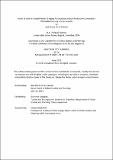| dc.description.abstract | Housing macro-projects have been central to Colombia’s urbanization tradition over the past century. A new set of laws put forth in the 2010s, and a particular economic chapter in the country’s history have brought a new wave of affordable housing macro-projects over the past decade through public and private cooperation that are characterized by their immensity. Vastness and complexity are fertile ground for an anonymity that can feed loneliness and disconnection. In this urban-suburban immensity, how do the stories, experiences, and voices of residents get heard as they try to contribute to a heated national debate about the future of the housing and urbanization policies that made Ciudad Verde possible? Academic research and urban planning can bring together these voices— containing the joys, pains, hopes, and fears of residents—to the center of the national conversation. Bottom-up, participatory, and action-focused research processes, as attentive to time as they are to space, can help us understand this multiplying new urban form, so big in scale it threatens to overwhelm.
Located on the outskirts of Bogotá, Ciudad Verde, an affordable housing complex that houses over 51.000 households, exemplifies the complexity of these macro-projects in terms of the possibilities that they bring to new residents and the challenges that come with this large-scale fast-paced urbanization. Through developing a Participatory Action Research structure and framework, the Resident Researcher Group of Ciudad Verde collected qualitative data around the experiences of habitation, coexistence, community, belonging and governance that take place for residents of Ciudad Verde.
Through the implementation of a photo-voice process and a civic conversation design process led by 10 resident researchers of Ciudad Verde, our outputs include audiovisual elements that further capture and elevate residents' voices and perspectives. Our hope is that these stories and testimonies will inform decision making for the future of Ciudad Verde, future affordable housing macro-projects in Colombia and the overall Housing Policy scheme that made these projects possible in the first place. | |
